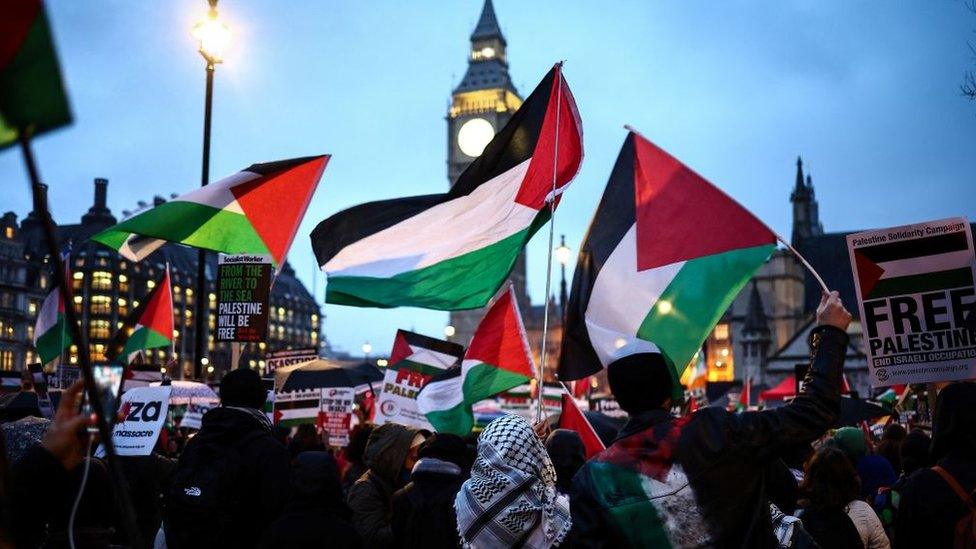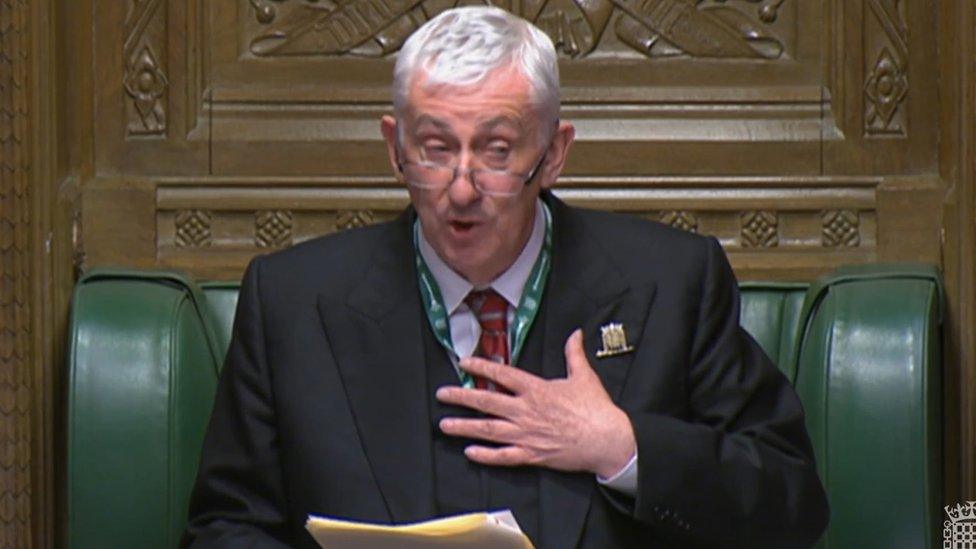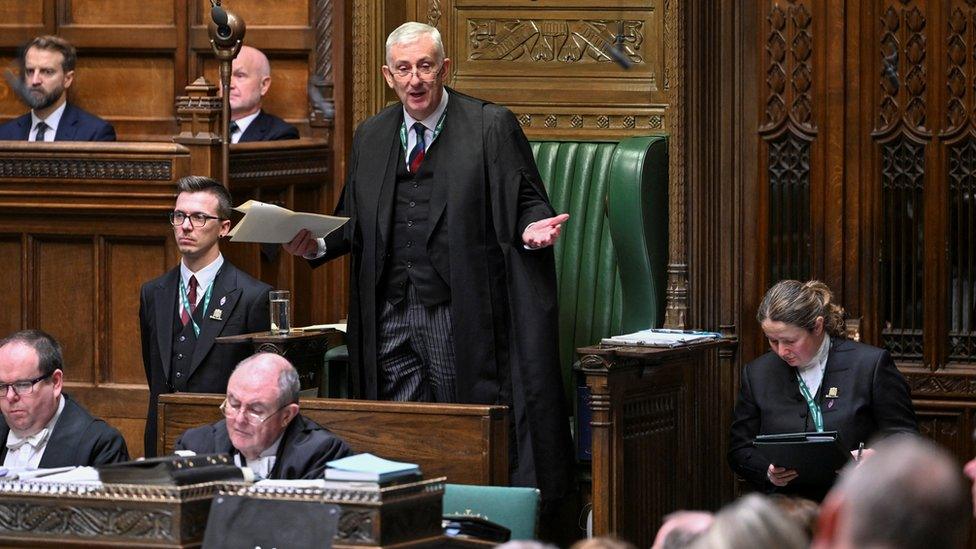Political violence adviser urges new police powers to protect MPs
- Published

Pro-Palestinian protesters gathered outside Parliament on Wednesday
Police should get extra powers to tackle protests outside Parliament, the author of a government-commissioned review has urged.
Crossbench peer Lord Walney said MPs needed protecting from "intimidation" that could influence how they vote.
His comments come after Commons Speaker Sir Lindsay Hoyle cited the threat to politicians in his controversial handling of a debate on Gaza.
It has reignited the heightened debate in recent years over the safety of MPs.
Asked about Lord Walney's recommendations, Home Secretary James Cleverly said he expected police to take action when protesters gathered outside MPs' homes with the aim of "distorting" how they voted.
But he added he did not think police needed "significantly greater" powers to tackle demonstrations outside Parliament.
A vote on a ceasefire in Gaza during a SNP debate on Wednesday descended into chaos after Sir Lindsay broke with convention to allow MPs to vote on a Labour amendment.
He argued that letting MPs vote on a wider range of positions would protect them from threats to their safety, amid heightened scrutiny of their stance on the conflict.
However, several Conservative MPs have questioned his decision to allow Labour's motion on safety grounds, arguing he was letting Parliament be intimidated by threats of violence.
Writing in the Telegraph, former Home Secretary Suella Braverman accused Labour leader Sir Keir Starmer - who argued for the wider vote - of "bowing to the mob".
Sir Lindsay has apologised for his handling of the vote, but it has plunged his position into crisis, with the SNP reacting furiously and declaring no confidence in him on Thursday.
More than 60 Conservative and SNP MPs have signed a Commons motion saying they have no confidence in him.
Defending his decision, the speaker said some of threats posed to MPs were "absolutely frightening," but he did not give details of specific threats.
Shadow home secretary Yvette Cooper said Ms Braverman's comments about Labour were "total nonsense". However, she said she agreed with tougher action to tackle protests outside MPs' homes, branding these a "disgrace".
'Corrosive effect'
Lord Walney, the former Labour MP John Woodcock, was commissioned three years ago to write a review into tackling political violence, which is yet to be published.
The Financial Times reported, external it was set to recommend a widening of police powers to break up protests outside democratic venues.
It said it would recommend extending Expedited Public Space Protection Orders, which can currently be used only to break up protests outside schools and vaccination clinics, to Parliament, MPs' offices and council buildings.
The orders, granted by local authorities, can last up to six months, with fines for those who breach them.
Speaking to BBC Radio 4's Today programme, Lord Walney said police needed an "easier and faster process" to disperse people from sites that were "crucial to the functioning to democracy".
He argued that the "aggressive intimidation of MPs" was having a "corrosive effect" on how politicians behaved.
"Even if they would not explicitly admit that they have voted in a particular way directly because of a threat, they are choosing to keep their heads down, not wanting to contribute," he added.
He said the issue had been "writ large" during debates over Gaza, but could also be a factor in a "number of issues" in future, including on climate change.
However, another former Labour MP who is now a crossbench peer, Lord Mann, the government's independent adviser on antisemitism, said the idea of banning "noisy demonstrations" outside Parliament was "dangerous".
"It is precisely where protests should be, not outside private homes, religious buildings or community centres," he wrote on X, formerly Twitter.
Public order powers
Asked whether police needed more powers to break up protests outside Parliament, Mr Cleverly said he did not think "significantly greater powers" were needed.
He added that the government took MPs' safety "incredibly seriously," and ministers had recently written to police making it clear they expected them to use the "full range of powers" at their disposal to protect politicians.
The government's Criminal Justice Bill, which is making its way through Parliament, will also give them greater powers, he added.
The Public Order Act, passed last year, gave police greater powers to tackle disruption at demonstrations.
Asked about Lord Walney's recommendations, Downing Street said it was already in "close contact with the police to ensure that they have the powers that they need to manage protests appropriately".
Parliamentary authorities do not publish details about MPs' security and offences committed against them.
However, it is known that spending on MPs' security has increased significantly since 2016, when Labour MP Jo Cox was murdered by a far-right 'terrorist'.
The debate over MP safety ramped up following the murder of Conservative MP Sir David Amess by an Islamic State fanatic in 2021.
In recent weeks, Conservative MP for Finchley and Golders Green Mike Freer has announced he will be standing down from Parliament after receiving death threats.
Related topics
- Published22 February 2024

- Published23 February 2024

- Published21 February 2024
